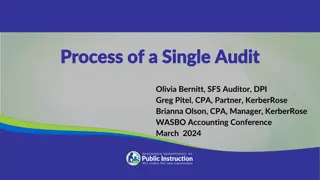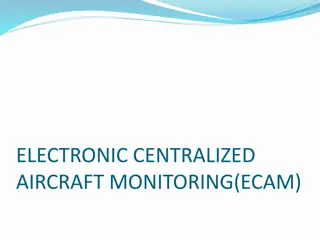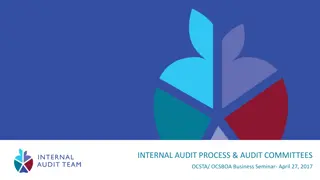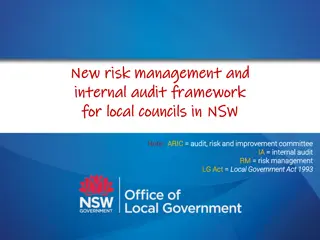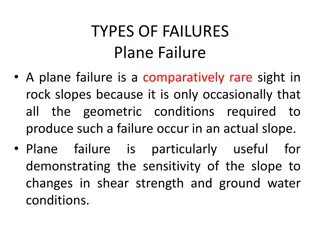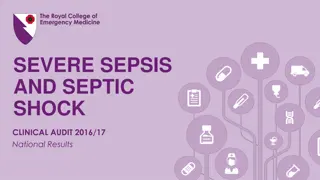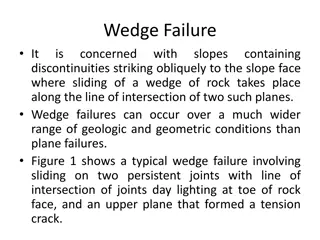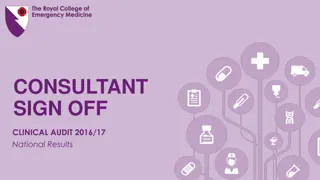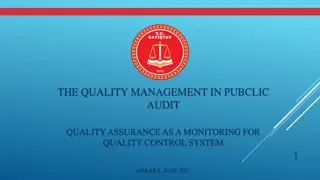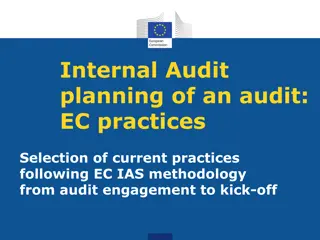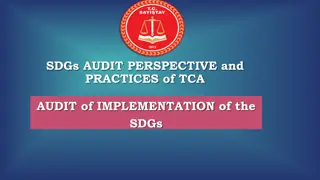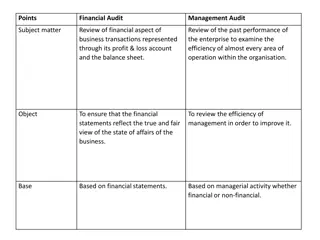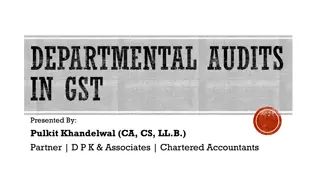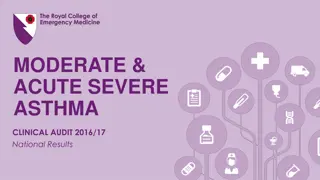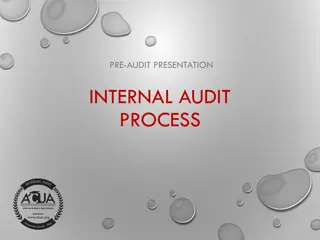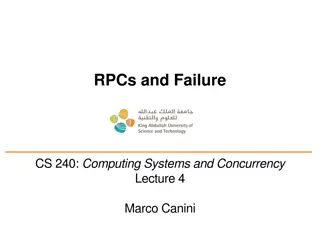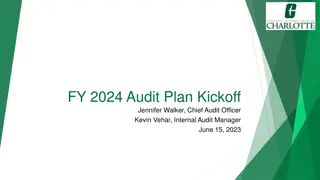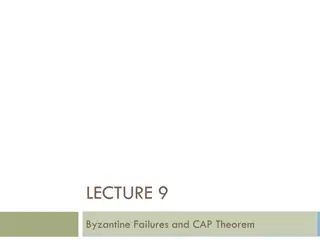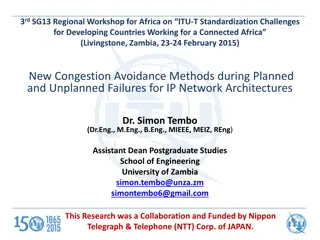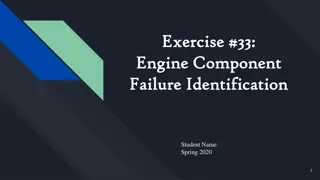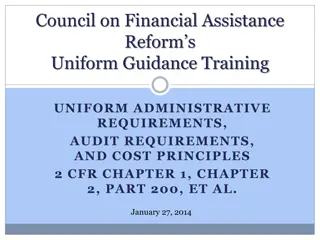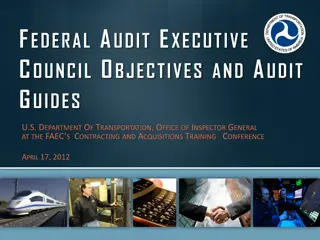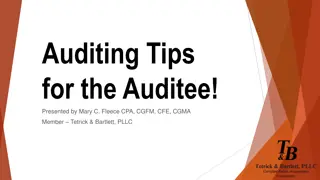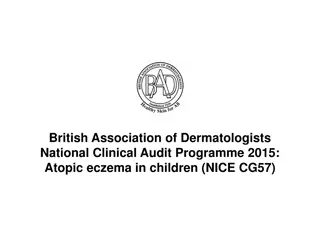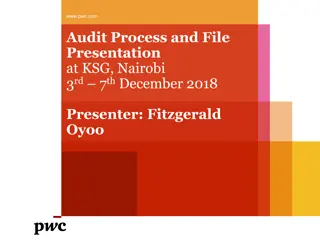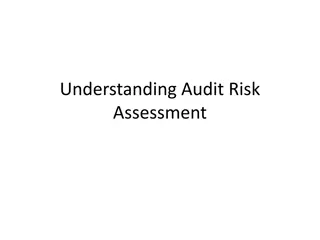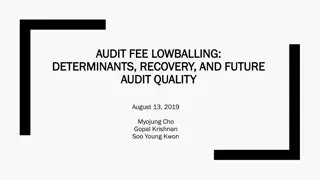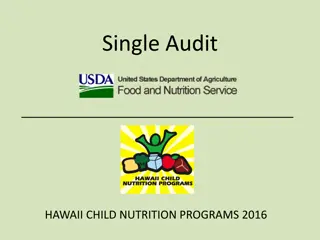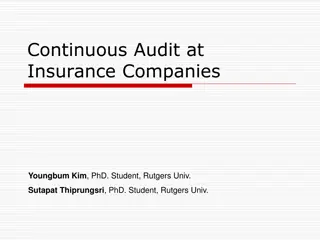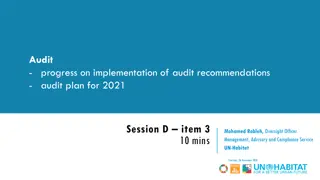Compliance with Audit Documentation
Understand the significance of audit documentation in proving compliance with audit requirements, ensuring quality audit work, and providing evidence for audit conclusions. Learn about the purpose, requirements, and definitions of audit documentation as outlined in auditing standards. Proper documen
6 views • 40 slides
Overview of Distributed Systems: Characteristics, Classification, Computation, Communication, and Fault Models
Characterizing Distributed Systems: Multiple autonomous computers with CPUs, memory, storage, and I/O paths, interconnected geographically, shared state, global invariants. Classifying Distributed Systems: Based on synchrony, communication medium, fault models like crash and Byzantine failures. Comp
9 views • 126 slides
Understanding the Single Audit Process for Federal Grants
The single audit process is a requirement for non-federal entities receiving over $750,000 in Federal awards, ensuring compliance with program requirements and Uniform Guidance. This audit involves examining financial statements and ensuring proper fund utilization. Auditee responsibilities and key
0 views • 36 slides
Audit of Ward-based IT Infrastructure at University Hospital of Limerick
In response to a cyber-attack on the HSE in 2021, an audit was conducted at University Hospital of Limerick to assess the accessibility of key healthcare-related computer programs. The audit revealed issues such as JavaScript errors, missing plug-ins, outdated software, and internet access issues. I
0 views • 4 slides
Understanding Electronic Centralized Aircraft Monitoring (ECAM) Systems
Electronic Centralized Aircraft Monitoring (ECAM) is a vital system that collects data from sensors throughout the aircraft, processes it, and displays key information to pilots efficiently. The system is composed of various components like System Data Acquisition Concentrators (SDACs), Flight Warni
0 views • 6 slides
Internal Audit Process & Audit Committees Overview
Explore the functions and responsibilities of internal audit processes and audit committees in the context of school boards in Ontario. Covering topics such as governance, risk management, compliance, and internal controls, the content delves into the structure, mandate, and activities of internal a
2 views • 34 slides
New Risk Management and Internal Audit Framework for Local Councils in NSW
This framework outlines the importance of audit, risk, and improvement committees (ARIC), internal audit (IA), and risk management (RM) in local councils in NSW under the Local Government Act 1993. It defines key terms, such as Audit Committee, Internal Audit, Risk Management, and the three lines of
1 views • 31 slides
Understanding Plane Failures in Rock Slopes
Plane failures in rock slopes are rare but significant, indicating sensitivity to changes in shear strength and groundwater conditions. Geometrical conditions must be met for such failures to occur, including specific alignments and interactions between the sliding plane and slope face. Analysis inv
0 views • 22 slides
National Audit Results for Severe Sepsis and Septic Shock 2016/17
This presentation outlines the national results of a clinical audit conducted in 2016/17 regarding the management of severe sepsis and septic shock in Emergency Departments (EDs). The audit objectives include benchmarking current performance, facilitating national and peer comparisons, identifying a
0 views • 25 slides
Impact of Data Analytics and Consulting Activities on Internal Audit Quality
This research examines how the use of data analytics and consulting activities affect perceived internal audit quality. The study investigates the relationship between these factors and top management's perception of internal audit quality. Through online scenario-based experiments with middle and t
2 views • 11 slides
Understanding Wedge Failures in Geotechnical Engineering
Wedge failures in geotechnical engineering occur when slopes with discontinuities experience sliding along the line of intersection of two planes. This type of failure can happen under various geological and geometric conditions and involves specific criteria such as the dip of the intersecting plan
0 views • 13 slides
National Clinical Audit 2016/17: Consultant Sign-Off Summary
This presentation displays the national results of the 2016/17 clinical audit, focusing on the performance of Emergency Departments (EDs) against audit standards. The audit objectives include benchmarking current performance, allowing national and peer comparisons, identifying areas for improvement,
2 views • 45 slides
Understanding Quality Assurance in Public Audit Systems
Quality assurance in public audit systems plays a crucial role in evaluating audit compliance, improving quality control processes, and detecting problem areas. It helps ensure effective operation and establishment of quality controls, supporting audit findings with proper evidence, disseminating go
1 views • 22 slides
Internal Audit Planning and Practices for Effective Risk Management
Planning an internal audit following EC practices is crucial for enhancing and protecting organizational value. The Internal Audit Service's mission focuses on providing risk-based assurance and advice to improve risk management, control, and governance processes. From audit engagement to kick-off,
0 views • 17 slides
Weatherization Energy Auditor Single Family - Energy Audit Software
This content discusses the standard curriculum for the Weatherization Assistance Program focusing on energy audit software for single-family homes. It covers learning objectives, terminology, energy audits, federal rules, and guidance related to energy audit approval procedures. Participants will le
0 views • 14 slides
Audit Practices for SDGs Implementation Evaluation in Turkey
This content delves into the process of auditing the implementation of Sustainable Development Goals (SDGs) in Turkey, focusing on renewable energy policies. It covers topics such as audit perspective, selecting audit topics, the link between national targets and SDGs, planning stages, defining audi
1 views • 22 slides
Comparison of Financial Audit and Management Audit
Financial audit focuses on reviewing financial statements for accuracy and compliance, while management audit assesses the efficiency of operations and future planning. Financial audit is a legal requirement for registered companies, conducted by chartered accountants, and emphasizes error detection
0 views • 17 slides
Understanding Departmental Audits in GST
Departmental audits in GST involve the examination of records, returns, and other documents to verify the correctness of turnover declared, taxes paid, refunds claimed, and input tax credit availed. This audit ensures compliance with the provisions of the CGST Act, 2017. Types of audits under GST in
7 views • 27 slides
Clinical Audit Results of Moderate to Acute Severe Asthma in EDs 2016/17
This clinical audit presentation showcases the national results of how Emergency Departments (EDs) are performing against the established audit standards for moderate to acute severe asthma in the year 2016/17. The objectives of the audit were to benchmark current performance, enable national and pe
1 views • 36 slides
Understanding and Managing Success and Failures: A Comprehensive Guide
Explore the contrasting lives of Ralph Lauren and Victor Green, highlighting the importance of managing both success and failures. Learn about overcoming fears, identifying root causes of emotions, enhancing self-esteem, stress management techniques, and efficient traits for managing success and fai
0 views • 12 slides
Understanding Internal Audit and Controls Process
This content provides an overview of the pre-audit presentation, objectives of the presentation, the definition of internal audit, the role of internal audit in examining university departments, the university audit process, internal audit reporting lines, and insights on internal controls in an org
3 views • 30 slides
Importance of Software Testing in Preventing Catastrophic Failures
Software testing is crucial in ensuring the reliability and safety of software systems, as highlighted by catastrophic failures such as the Ariane 5 rocket incident and the Therac-25 radiation therapy machine disasters. These examples underscore the importance of thorough testing in identifying and
1 views • 42 slides
Handling Failures in RPC Systems: Strategies and Considerations
Exploring the challenges and strategies for handling failures in RPC systems, this lecture delves into potential issues such as client crashes, packet loss, server failures, and network slowdowns. The At-Least-Once scheme is discussed as a simple method for managing failures and ensuring data integr
2 views • 22 slides
Internal Audit Department Overview
The Internal Audit Department at the University of North Carolina Charlotte is led by Chief Audit Officer Jennifer Walker and Internal Audit Manager Kevin Vehar. The team provides risk-based assurance, advisory services, and investigations to enhance organizational value. Their mission is to offer o
1 views • 17 slides
Byzantine Failures and CAP Theorem Overview
Byzantine failures refer to arbitrary patterns of failures where nodes exhibit inconsistent behavior. This lecture discusses Byzantine agreement and the challenges in reaching consensus with faulty nodes. It explores the minimum number of processes needed for consensus and extends the concepts to ge
1 views • 32 slides
New Congestion Avoidance Methods for IP Networks
This research presentation highlights the challenges of IP network failures, focusing on planned and unplanned scenarios. Dr. Simon Tembo discusses innovative methods to prevent congestion during failures, including a backup topology design for unplanned failures and a congestion avoidance approach
2 views • 40 slides
Causes of the Great Depression: Economic Turmoil and Bank Failures
The Great Depression was characterized by an extraordinary reversal from prosperity to misery in the American economy. Factors such as a sharp decline in demand for goods, bank failures, and the Federal Reserve System's actions contributed to the crisis. The failure to prevent bank failures and the
0 views • 19 slides
Engine Component Failure Identification in Spring 2020 - Common Tests and Real-world Examples
In this presentation, students are tasked with connecting common engine performance test results with real-world component failures. The slides include images and descriptions of various failures such as blown head gasket, worn piston rings, burned valves, damaged cylinder walls, and more. The goal
0 views • 13 slides
Conducting an Effective School Energy Audit
Performing an energy audit at a school helps in understanding energy usage patterns, identifying areas of waste, and creating energy-saving action plans. The audit involves collecting data, creating switch-off lists, and filling out templates methodically to track energy consumption. It should be do
0 views • 16 slides
Reforming Audit Requirements for Federal Awards
This presentation outlines the major policy changes in the government-wide requirements for auditing Federal awards under the Single Audit Act Amendments of 1996. It discusses the transition from OMB Circular A-133 to Subpart F-Audit Requirements in 2 CFR Part 200, focusing on targeting audit requir
1 views • 34 slides
Federal Audit Executive Council - Contract Closeout Guide Highlights
The Federal Audit Executive Council (FAEC) plays a vital role in coordinating issues affecting the Federal audit community, with a key emphasis on audit policy and operations. The FAEC's contracting committee has developed audit guides covering various topics like acquisition planning, market resear
1 views • 12 slides
Essential Tips for a Successful Audit Process
Learn key insights for effectively preparing and participating in an audit process, including understanding annual audit requirements, the importance of the initial steps, maximizing the audit process, and crucial steps for a successful audit. Gain a comprehensive overview to streamline your organiz
0 views • 17 slides
Analysis of Atopic Eczema in Children: A National Clinical Audit Program
The British Association of Dermatologists conducted a national clinical audit program in 2015 to evaluate atopic eczema in children based on NICE guidelines. The audit included contributions from BAD and BSPD members, as well as private providers. It involved 128 submissions from 98 centers, with 12
2 views • 18 slides
Key Considerations for a Successful Audit Process in Nairobi
Understanding the importance of audit file preparation and key considerations for a successful audit process in Nairobi. Key staff participation, management of audit process, sharing draft financial statements for quality review, and following Act requirements are crucial steps for a successful audi
0 views • 23 slides
Handling Errors and Failures in Software Design and Implementation
Exploring the concepts of dealing with errors and failures in software development, focusing on assertions and exceptions. Discusses the importance of preventing complete failures, giving information about problems, and preventing harm when things go wrong. Emphasizes the significance of structuring
0 views • 37 slides
Understanding Audit Risk Assessment Process
Learn about the audit risk assessment process, including objectives, risk assessment techniques, and the PPC audit approach. Understand preliminary engagement activities, client acceptance/continuance considerations, and important documentation. Explore how to assess risks of material misstatement a
0 views • 61 slides
Auditing Lowballing: Impact on Audit Quality and Recovery
The study explores the practice of lowballing audit fees and its effects on auditor independence and audit quality. Key research questions examine the relationship between non-audit fees, client importance, and lowballing, as well as the recovery of initial fee discounts. Hypotheses suggest connecti
0 views • 12 slides
Understanding Single Audit Requirements for Hawaii Child Nutrition Programs 2016
In accordance with federal regulations, non-Federal entities that expend $750,000 or more in Federal funds, including USDA's child nutrition programs, are required to undergo a Single Audit. The audit must be completed within nine months of the organization's fiscal year-end, and the final report mu
0 views • 5 slides
Continuous Audit at Insurance Companies
Creating a rule-based model for anomaly detection, this research focuses on developing an architecture for continuous audit systems. By utilizing historical data, the scope includes detecting fraud, discrepancies, and internal control weaknesses, leading to a maturity model for automated continuous
0 views • 27 slides
Overview of UN-Habitat Audit Progress and Best Practices 2020-2021
The UN-Habitat audit for 2020-2021 showcases adherence to international best practices, including distinct internal/external audit functions, risk-based methodology, and operational independence. Audit coverage spans regional, country, and global operations, with critical business processes under sc
0 views • 9 slides


